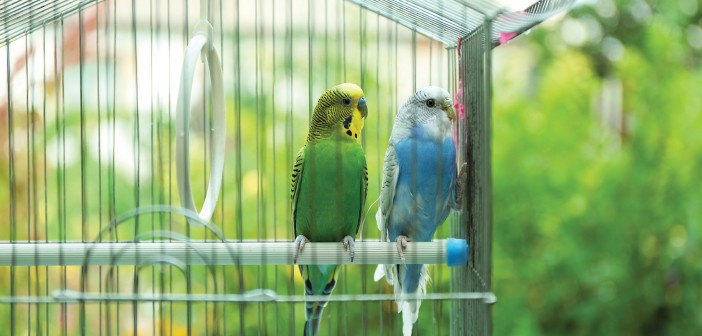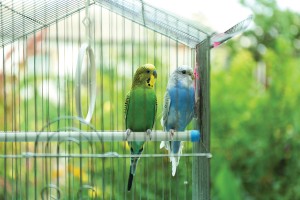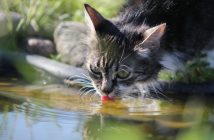by Chase Kimball
I was once involved in a Facebook dispute with someone about keeping parrots as pets. He noted parrot cages were frequently filthy. I seemingly commiserated with him, noting I’d put a mop and a bucket in my cockatoo’s cage and he made no effort to clean up. My point, of course, is that while it is frequently true that a parrot’s cage is dirty, it isn’t the fault of the parrot. You are responsible for cleaning up after him. But thoroughly cleaning a parrot’s cage can present significant obstacles.
Having kept parrots for over 20 years, I have cleaned many a cage. I try to clean the smaller cages about once a week, and the larger ones once a month. I have it relatively easy, since I live in a house in the suburbs and can easily wheel cages out on the porch and give them the hose treatment. But living in Utah, and fostering birds who may come with difficult to move cages, I don’t away get off so easily. Still, in general, cage cleaning doesn’t have to be a nightmare.
To start, I wheel the big cages out on my front porch, and put the smaller cages on the lawn. I keep the birds in travel cages during the cleaning process. Remove bird toys and anything else that might get damaged by water. Everything gets hosed down thoroughly in such a way that the water also goes out onto my lawn and is not wasted. Then I wipe everything down with a soapy sponge, rinse, and let it all dry in the sun for a few minutes. Not exactly a complex maneuver.
Living in Utah, there are weeks on end that are too cold or snowy to clean effectively outside. And living in an apartment can mean no easy outdoor access. That’s when a little ingenuity is called for. I clean smaller cages in the shower and that works well. Some people carefully clean a large, inside cage with a soapy sponge. I use a Haan steam mop to clean large areas, then follow up with a soapy sponge for the tight corners it doesn’t fit into. It doesn’t put out a lot of steam, so there isn’t water dripping all over the place while I use it, and it uses pure steam and no chemicals are involved. I can also use it to mop around the cage after I finish cleaning it and pick up all the debris.
However, not everyone is thrilled with steam cleaners; one of my correspondents noted she used to have a one she used weekly on a variety of cages, but it put out so much steam she began having mold problems. She stopped using it and went back to a soapy rag.
Everyone has their own way of cleaning bird cages, but when I checked in with the local bird community, there were three products that came up in the discussion repeatedly. Many people I know swear by Dawn dishwashing liquid. saying it’s the only thing they will use because it makes the cleaning go much faster.
Another very highly regarded cleaner is called Poop-Off. It is designed specifically for cleaning bird cages, and uses enzymes to instantly dissolve the poop so you can wipe it off immediately. Both organic and non-toxic, you can use it around birds.
Birds are very sensitive creatures so you need to be careful with what you use around them; even something as innocuous as a scented candle can kill a bird. Because you must use great care with your cleaners to make sure they are safe, it’s really nice to know there is something like Poop-Off you can use without danger. It is available at a variety of places, including Amazon and Petsmart.
The detergent that gets the highest marks is Murphy’s Oil Soap. It comes in concentrated form and you can mix it to whatever strength you want depending on how tough the job is. It is also non-toxic to birds. One of my sources described it as “magical.” Since she has about 30 birds and is constantly cleaning up after them, if she says it’s magical, I am going to pay attention. Another great thing about Murphy’s Oil Soap is that it leaves a thin film on what you wash with it, making it simpler to clean up the next time.
Keeping your bird cages clean is important for the health of your bird. They do tend to get dirty quickly because parrots like to fling food around, and if you want to live in a happy, clean home this issue has to be addressed. But if you keep on top of the cleaning, it’s easy and can be quick to do.
Chase Kimball, a local attorney and graduate of the U of U law school, acquired his first bird in 1994, and his parrot education began. Since then, he has been active in local parrot circles and was the first rescue director for the Wasatch Avian Education Society.





